I quit my suit-and-tie marketing job at age 27 to pursue the only thing I’d ever really cared about, which was playing music.
That was 29 years ago!
Looking back on it, there are lots of things I wish I’d known then – things that would have saved me lots of headaches.
I hope one or more of these might be helpful to you…
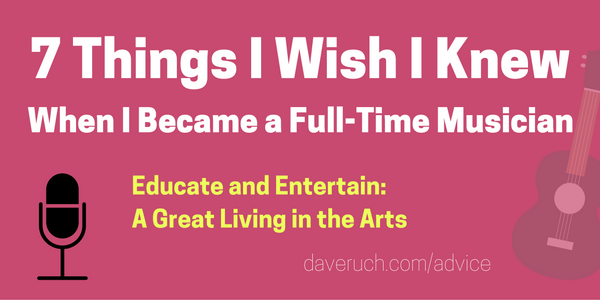 1. I’ll burn myself out playing 4-5 nights a week
1. I’ll burn myself out playing 4-5 nights a week
For 3-4 hours a night…
You probably have more stamina than I do.
For me, it only took about two and half years of full-time musicianship before I’d developed a pretty debilitating case of tendonitis owing to long bar gigs with loud bands.
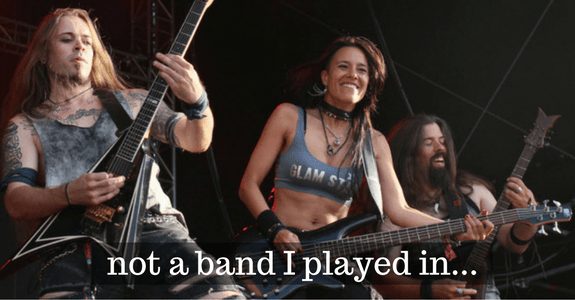 In 1995, seemingly out of nowhere, I was faced with the need to scale back my playing considerably while still making a living as a musician!
In 1995, seemingly out of nowhere, I was faced with the need to scale back my playing considerably while still making a living as a musician!
(If you’re curious about how I accomplished that, you can see more here.)
2. Health insurance is expensive!
Holy crap.
Separate from what your feelings might be on the Affordable Care Act here in America, health insurance is just expensive, and becomes more so every year. Plan for that.
3. I can write off all my clothes
And my new computer!
For the first few years of self employment, I did my own taxes and had no idea how many deductions I could be taking.
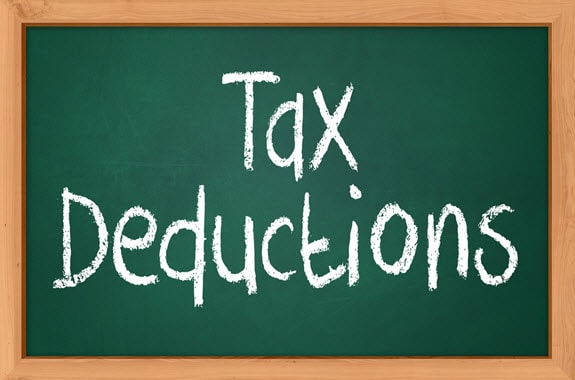 Once I wised up and hired an accountant, I was able to save lots of money (far more than the accountant’s fee) by taking advantage of write-offs and deductions I knew nothing about.
Once I wised up and hired an accountant, I was able to save lots of money (far more than the accountant’s fee) by taking advantage of write-offs and deductions I knew nothing about.
Highly recommended.
4. Teaching people to play music is only fun if they practice
(Which they don’t. At least, not usually.)
A big part of my plan when I first went “pro” was to generate some income giving instrumental lessons out of my house.
I busted my butt to get students, and it worked.
Over a six-month period, I had built up my teaching business to a steady roster of 30-35 students a week.
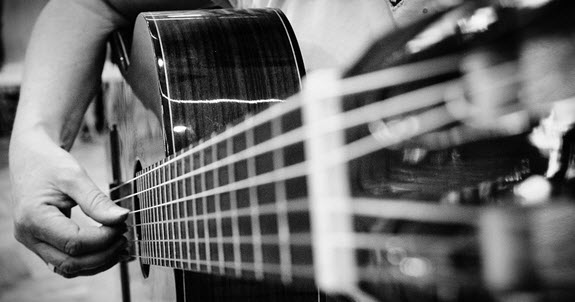 It was great daytime work, and it did keep me in good practice having so many hours each day with an instrument in my hand.
It was great daytime work, and it did keep me in good practice having so many hours each day with an instrument in my hand.
The more I did it, though, the less I enjoyed it.
While my students seemed perfectly happy coming back and shooting the breeze every week, going over the same stuff we’d done the week before (and the week before that), and then getting sucked back into their busy lives, it just didn’t feel satisfying to me.
I enjoyed the social aspect, but just didn’t feel fulfilled by the teaching.
Fortunately, within a few years I had stumbled into the much-better-paying world of educational performing.
Once I got busy enough with that, I moved on from giving lessons.
5. Nobody in the audience is scrutinizing every note I play and sing
They’re there to have a good time, period.
Help them do that, and everyone wins.
Or, said another way – get over yourself.
6. Some days there will be LESS time for music than before
What?
It’s funny to think back on all the utopian visions I had about what my life would be like after breaking free from my corporate job to pursue music full-time.
 I pictured long thoughtful conversations with fellow artists, tons of time to play and create music, lots of leisurely work on personal recording projects, and so on.
I pictured long thoughtful conversations with fellow artists, tons of time to play and create music, lots of leisurely work on personal recording projects, and so on.
So it’s not like that?
Well, not if you need to make a decent living. It’s a lot more like this, and this.
I wouldn’t trade it for the world, but it’s not exactly the way I’d envisioned it.
7. I can make a sustainable living as an independent musician!
Amazing.
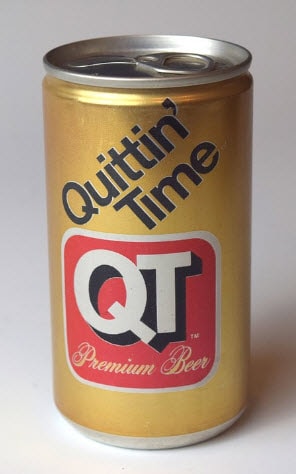 I really had no idea how this experiment would turn out when I decided to leave my secure job (with benefits) all those years ago.
I really had no idea how this experiment would turn out when I decided to leave my secure job (with benefits) all those years ago.
In retrospect, I feel very fortunate that I made the break at a time when I was young and adaptable, single, and without many large expenses. I could afford to take the chance, and had a college degree to fall back on if it all went to hell.
But it didn’t!
The big lesson?
If there’s one thing I’ve learned about the route of the independent artist, it’s that there are hundreds of well-worn paths you can take, and many more that can be created out of thin air.
I make my entire living as a musician without intersecting one bit with the music “industry.”
Go figure.
It’s the ability to work really hard at building your business – yes, your business – that might determine how it goes for you. This blog is here as a free resource to help you do just that.
If you’re not already subscribed, you can do that right here.
For those who do this full time – what else would you add to my list here?
The “Comments” section is below.
About The Blog
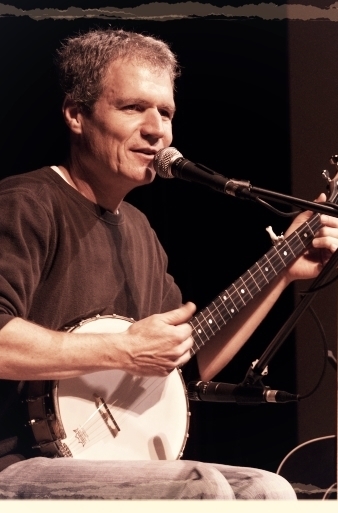 Since leaving a white-collar marketing job in 1992, Dave Ruch has been educating and entertaining full-time in schools, historical societies and museums, folk music and concert venues, libraries, and online via distance learning programs.
Since leaving a white-collar marketing job in 1992, Dave Ruch has been educating and entertaining full-time in schools, historical societies and museums, folk music and concert venues, libraries, and online via distance learning programs.
Along the way, he’s learned a great deal about supporting a family of four as a musician.
The Educate and Entertain blog provides articles, tips, encouragements, and how-to’s for regional performers (in any region) interested in making a great full-time living in the arts.


Great stuff. Non traditional, under the radar, yep, that’s what I do.
I was in about 15 bands, trying to make the big time, working day jobs to pay for it, the worst of both worlds.
Then the penny dropped. That was approx 25 years ago and since then I’ve been a full-time independent musician, similar to yourself but my ‘thing’ is nursing homes, day centres and seniors groups.
I’m from Melbourne Australia. I play gtr, sing a bit and try to have a bit of fun.
Thanks and regards Alex Hearst
Right on, Alex!
Good for you and thank you for the info. Ive just decided to become a working musician. I love performing and would love to play anywhere. So its worth a try
Best of luck to you, John!
I love your blog posts and emails. you are a great example to follow. In the list above #6 really resonates. I still find it hard to find time to actually make new music! LOL Oh and glamour? ya really glamorous lugging PA gear up 3 flights of stairs at 1 am. for $150 NOT. this is why I’m now aiming for songwriting and synch licensing. thanks for all you do Dave
Thanks LJ!
I think being aware of and finding other playing opportunities. For example, I LOVE performing at wineries! The hours great–2-6 at my usual winery. The pay is very good & plenty of options as a single, duo, or full band. Interestingly… I started playing at wineries about 10 years ago. Today EVERYBODY is dying to land these coveted gigs (at least in the St. Louis market). The sun is up when I’m setting up. The sun is up when I get home– no getting home at 2 or 3 in the morning and then moving gear inside. Yuck!
Other …
Not in a wedding band but I play often at ceremonies. Funerals, too– definitely an opportunity to serve others during a difficult time. Quite rewarding!
In summary … explore outside the box for other playing opportunities. They are plentiful!
Agreed across the board, Stephen. No shortage of ways to do this on terms we can live with.
Very good advice. The sustainable living one was one I allways questioned myself.
Hi Dave, what a great blog post (again)!
Things I would like everybody to know before working in any field of the showbusiness:
1. Keep an open mind!
I started out becoming a singer, and I did. But my showbusiness path led me to tv, radio, musical theatre, studios, voice acting etc. I have worked in almost every field possible, as well on stage as behind it. I chose to run with the wind instead of keeping a tight vision.of what I was ‘supposed’ to do.
2. Look at the bigger picture.
If something didn`t work out, and it kept repeating itself, I stopped,and thought: this probably isn`t the way for me. Sometimes I was (very) dissappointed, because I had dreams and goals. But as soon as I stopped doing the stuff that didn`t work, something else (which suited me and my wishes much better) presented itself. It has to do with the guts to let go. It can be scary, but it happened so many times, that to this day this way of thinking and living actually still works great for me. I had a great performing career for more than 20 years. After that I ran a professional school of performing arts for 16 years, And now I`m coaching artists around the world and I’m a theatre- & music director (so that`s for desiring a singing career ;-))
3. Don`t do it alone.
Any great career needs people around you who can support you when things don`t work out well. People like to be around you when you`re succesful, but most of them walk away when you`re not. Cherish the people who stay with you nomatter what, and love them with all you have!
4. ,It`s work.
Great passions have the tendency to engulf you. But nomatter how much you enjoy what you`re doing, step back from the canvas sometimes. Writer Elizabeth Gilbert once said: “My creative expression must be the most important thing for me ( if I want to live an artistic life), and at the same time it shouldn`t matter at all (if I want to live a healthy life)” Clear your mind with this paradox: It`s important / it`s not important.
5. Read this book: ‘Big Magic’ – Elizabet Gilbert.
Hope my tips help 😉
Have a good day everyone!
Love this YvonJane! Thanks so much for sharing…
I’ll be ordering that book in about 5 minutes before I forget.
Your advice sounds really solid and it’s pretty comforting. My significant other has been pressuring me to go down to at LEAST part time so I can take more gigs. I work 6 days a week in a restaurant making next to nothing and it’s becoming absurdly depressing, but even though I haven’t been given a tangible reason to doubt myself, I do. Stability is important and what if I can’t pay the bills?? Like, sure I may be able to sing my stuff and get paid this week, but what about next week, ya know?
Playing music for a living is a job. Most jobs suck, that’s why they pay you. Being a ski instructor or a golf pro is also a job. Even what sounds like a fun job eventually turns into a job that most likely sucks. If what you want is to just play good music, don’t consider becoming a full time musician. There is far more musical enjoyment to be had playing with your friends in the living room. Performing every night in a nasty bar full of obnoxious drunks that don’t really appreciate your music or even in old folks homes on a regular basis can suck. Very few musicians get to experience the “rock star” feel of playing to a large audience that really is digging your tunes. Every now and then a magical moment occurs that can recharge you but they are usually few and far between.
Playing music for a living is largely whatever you make it. If you continue to play gigs you hate, you will hate your “job” playing music. Been there. Done that. Eventually I was honest with myself about what I really enjoyed and didn’t enjoy. So now, I enjoy playing,the majority or the time. Contrary to what everyone thinks, you simply don’t need to do everything that’s available to you as a professional musician. If you don’t like playing bars, find other places to play. If you really hate teaching private lessons, find other ways to make money as a musician.
Andy, I don’t disagree with anything you said, but like Brad, I see lots of shades of grey between your black and white of shitty bar gigs/old folks homes and playing for adoring throngs. Finding and cultivating those off-the-beaten-path opportunities for satisfying work is where I’m at, and what this blog hopes to help others with.
That I don’t have to “pay to play” to get “exposure”
Very true Dianna!
Most artists starting out, do have to “pay to play” for exposure. The problem comes when they are still playing for exposure a couple years later at the same kind of venues.
Lovin’ it and thanks for all the info!
I performed in “the silver circuit” years ago and,after a few years away,I’ve recently returned to it.
I’m an OLD (age 66), NEW (5 years playing out) vocalist-guitarist, making a living in music these past two years. My bread & butter is the 45-60 minute concert in rehab/nursing facilities within a 2-hour drive. Besides musical talent, it requires specialized attributes – such as empathy, disability blindness, a wide-ranging repertoire, and flexibility. I get to play various ensemble work at public venues some evenings and weekends.
I’ve found your posts to be spot-on, a great value to your subscribers!
Thanks again Dave for some helpful hints. I need to remind myself about “people don’t care about every note I play” I think most of us are our own worst critics and as you say “get over yourself.”
I would only add that, if you’re serious about even a part-time career in music, then take it seriously. Remember you’re not there to party, someone is paying you. It really is a job, but one that puts a smile on your face and hopefully your audience.
Great advice Doug!
Something I would like to add Dave is that not every gig is a party. Be careful how much and how often you drink at your shows. Just because a venue offers you free drink doesn’t mean you have to drink to access or even at all. I used to think I was cheating myself by not drinking at gigs, it was, after all part of my payment right? But I now know that I play way better with no alcohol and I even feel good the next morning. Thanks for all you do Dave.
Thanks Ian – so important.
Dave!
This is great and really encouraging. It’s refreshing to hear you talk about your experience teaching lessons. YES! That’s how I feel too!! Good to know there ARE other options.
Thank you for sharing!
I’m not the only one then! Thanks Joseph.
Hi, Dave! This is a great encouragement to me.
I play harmonica (mouth harp ) in styles like blues, gospel, boogie, r’n’r and country…
and I am considering going full time into musicianship.
I can learn a lot from you.
How did you manage to switch from dayjob to full time musicianship?
I am now on social security money, and I am seeking ways to earn some money, doing translating (english/slovenian language ) and looking for a job, but I wonder if I could go this route and still go succesfully into playing music professionally or semi professionaly.
I had to invest time to read your post, and I trust you have a lot of great resources here.
What I’d really love to do is playing and recording for the Lord from Nazarete.
Hi Robert – I’ve written quite a bit on this blog (40 articles and counting!) about making a good full-time living as a performer. I hope some of the other articles will be helpful to you.
This gives me hope. Thanks Dave.
Hey Jeffrey – glad to hear it!
Thanks so much, Dave. We’re long overdue to have someone like you out there.. Thanks for sharing all your vision and wisdom in an ongoing format Keep it comin’. Looking forward to the next post already!
Happy Holidays. And yes; we’re all busy holiday giggin!!
Jacque – that’s very kind of you. Glad to hear you are busy with gigs!
After doing live gigs for decades, since the age of fourteen, I too have learned the hard way. Things I wish I knew when I became a musician:
1) my audience would be mostly drunk people
2) almost everything is tax deductible for a musician
3) my shelf life as a woman in “pop” music would be very short
4) nobody would walk in and “discover” me
5) most male musicians don’t want to be in a band fronted by a woman
6) my body clock would become permanently upside down
7) It’s possible to come to dislike playing music, especially when doing eight gigs a week for years!
Thanks for sharing Xanthe!
I love being in a band fronted by a woman!
I love playing a supporting role……and backing a good female frontperson is top!
Hi Dave,
Yes, exactly. You’re perfectly right.
What could I add to this list ? Well, just be what you really are. Don’t do what you think other people want you to do.
Work hard, and have faith.
Thanks for you blog, it’s gorgeous !
Aymeric, from Brittany, France
Thanks Aymeric, I appreciate that.